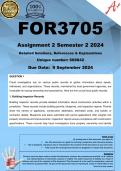FOR3705
Assignment 2 Semester 2 2024
Detailed Solutions, References & Explanations
Unique number: 668842
Due Date: 9 September 2024
QUESTION 1
Fraud investigators rely on various public records to gather information about assets,
individuals, and organizations. These records, maintained by local government agencies, are
invaluable for tracing ownership and associations. Here are five crucial local public records:
1. Building Inspector Records
Building inspector records provide detailed information about construction activities within a
jurisdiction. These records include building permits, blueprints, and inspection reports. Permits
show the names of applicants, construction addresses, estimated costs, and builder or
contractor details. Blueprints and plans submitted with permit applications offer insights into
property structures and improvements. Inspectors' reports ensure compliance with construction
specifications. These records help fraud investigators trace property ownership and identify
individuals associated with construction activities, potentially uncovering hidden assets or
undeclared
Terms of use
By making use of this document you agree to:
• Use this document as a guide for learning, comparison and reference purpose,
• Not to duplicate, reproduce and/or misrepresent the contents of this document as your own work,
• Fully accept the consequences should you plagiarise or misuse this document.
Disclaimer
Extreme care has been used to create this document, however the contents are provided “as is” without
any representations or warranties, express or implied. The author assumes no liability as a result of
reliance and use of the contents of this document. This document is to be used for comparison, research
and reference purposes ONLY. No part of this document may be reproduced, resold or transmitted in any
form or by any means.
, +27 67 171 1739
QUESTION 1
Fraud investigators rely on various public records to gather information about assets,
individuals, and organizations. These records, maintained by local government
agencies, are invaluable for tracing ownership and associations. Here are five crucial
local public records:
1. Building Inspector Records
Building inspector records provide detailed information about construction activities
within a jurisdiction. These records include building permits, blueprints, and inspection
reports. Permits show the names of applicants, construction addresses, estimated
costs, and builder or contractor details. Blueprints and plans submitted with permit
applications offer insights into property structures and improvements. Inspectors'
reports ensure compliance with construction specifications. These records help fraud
investigators trace property ownership and identify individuals associated with
construction activities, potentially uncovering hidden assets or undeclared property
ownership.
2. Health and Fire Department Records
Health and fire department records are essential for ensuring businesses comply with
local safety and health regulations. These records include permits issued for health
and safety code compliance and routine inspection reports. Information in these
records often includes business operations details, employee information, and
ownership data. For example, health department records for restaurants provide
insights into ownership and operational standards. Fire department records ensure
compliance with fire codes, indicating who is responsible for maintaining safety
standards. These records are valuable for locating business assets and identifying
individuals associated with specific enterprises.
3. Birth and Death Records
Birth and death records maintained by local health agencies offer a wealth of personal
information. Birth records include names, addresses, birthplaces, and parent details.
Death records provide data on the deceased, such as name, address, date and place
of death, and close family members. These records can help fraud investigators trace
family connections, locate heirs, and identify individuals linked to estates. They also
Disclaimer
Extreme care has been used to create this document, however the contents are provided “as is” without
any representations or warranties, express or implied. The author assumes no liability as a result of
reliance and use of the contents of this document. This document is to be used for comparison, research
and reference purposes ONLY. No part of this document may be reproduced, resold or transmitted in any
form or by any means.
, +27 67 171 1739
provide government identification numbers, aiding in verifying identities and
uncovering potential fraudulent activities involving deceased individuals.
4. Voter Registration Records
Voter registration records, where accessible, contain personal information about
registered voters. These records often include names, addresses, dates of birth, and
political affiliations. Although privacy laws may restrict access to some information,
voter registration data can still be useful for verifying addresses and tracing individuals.
Fraud investigators can use these records to confirm residency, identify voting
patterns, and link individuals to specific locations. They also help in cross-referencing
other public records to build comprehensive profiles of subjects under investigation.
5. Marriage Records
Marriage records provide detailed information about individuals' marital histories.
These records include marriage licenses and applications, which contain names,
maiden names, previous marriages, addresses, and dates of birth. Maintained at local
offices such as county clerk's offices, marriage records are crucial for establishing
family connections and tracing name changes. Fraud investigators can use these
records to identify spouses, uncover hidden assets linked to marital property, and
verify personal information. Marriage records also reveal associations between
individuals, helping investigators build relationships and networks involved in
fraudulent activities.
In conclusion, these local public records offer comprehensive information essential for
fraud investigations. By accessing building inspector records, health and fire
department records, birth and death records, voter registration records, and marriage
records, investigators can trace assets, verify identities, and establish connections
between individuals and properties. These records are instrumental in uncovering
hidden wealth, locating assets, and identifying key players in fraudulent schemes.
QUESTION 2
2.1.
Disclaimer
Extreme care has been used to create this document, however the contents are provided “as is” without
any representations or warranties, express or implied. The author assumes no liability as a result of
reliance and use of the contents of this document. This document is to be used for comparison, research
and reference purposes ONLY. No part of this document may be reproduced, resold or transmitted in any
form or by any means.




